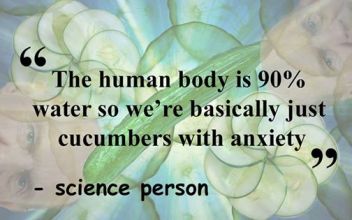Part 3 of a series in which I explain why absolute advice given to writers is more wrong than this:

Part 1 focused on the advice “you must write every single day” and can be found here: No Absolutes in Writing #1
Part 2 focused on the mandate “you are either a planner or pantster” and can be round here: There Are No Absolutes in Writing #2
Today’s Absolute Advice: Show, don’t tell.
I can hear the collective gasp. Writers reading this are already disagreeing with me. Do I care?
Maybe a bit because I’m just a cucumber with anxiety and I desperately want everyone to like me please like me don’t click off my blog I swear I’m going to make some good points please please please read on.
No, I don’t care! I’m a rebel.

The wisdom behind it: ‘Telling’–simple exposition like “Dave was a cockwomble.”–is apparently dull, lazy, and/or amateur.
Everything must be ‘shown’ through description or dialogue:
Dave swaggered into the playground and planted his feet a metre apart as if his balls were too big for designer jeans to contain.
“Kids!” he shouted. “Santa’s not real and your mama’s wished, at least once a day since you were born, that she was a virgin. Which she’s not. That woman’s had more cock than KFC.”
Sensible advice: Telling has its place. Showing has its place. Use the right one in the right place and your writing will be approximately 394.54% better than someone who ONLY tells or ONLY shows.
Let’s take the example above.
“Dave was a cockwomble.” may well be the best choice for getting that piece of information across to the reader. Perhaps Dave is a lowly side character we’re never going to see again and it doesn’t actually matter whether he’s a cockwomble or not. What matters is the way our narrator–our main character, Sarah–thinks of him.
Sarah’s directness of thought and choice of the word “cockwomble” adds to her characterisation, doesn’t it? Moreso than if she was sat on a bench in the playground watching Dave be a cockwomble to a bunch of crying kids.
‘Telling’ adds to Sarah’s characrerisation. ‘Showing’ adds to Dave’s. If we’re never going to see Dave again, telling is just fine.

Of course, you could show Sarah’s thoughts in such a way that would add to her characterisation:
Dave swaggered into the playground and planted his feet a metre apart as if his balls were too big for designer jeans to contain.
“Close your legs, you damn cockwomble,” Sarah shouted at him. “I could drive my fucking articulated lorry through there.”
But if Sarah is the kind of person who thinks vicious thoughts all day but on the outside is meek and agreeable, she’s not going to do that. She’s going to sit on the bench calmly, not displaying any behaviour that one can ‘show’. Telling is just fine.
It can be exhausting when a writer has taken ‘show, don’t tell’ to heart. I’ve just chosen a random paragraph from one of my novels where I use both showing and telling:
It felt like Rachel’s mattress was stuffed with broken glass. She lay awake for hours until, just when she was too exhausted to register the pain and started to drift off, her phone rang.
SHOW, DON’T TELL, ANNA. Get rid of that damn telling!
It felt like Rachel’s mattress was stuffed with broken glass. The moon moved forty-five degrees across the sky before exhaustion eclipsed the daggers in her side and her eyes closed. Then a peal from a slim plastic and metal electronic device rent the air and she sat up with a gasp.

OH for heaven’s sake Anna, you cockwomble, just tell us a few hours passed, then as she was falling asleep her phone rang!
But the original combination of showing and telling is better than this version of all telling, in my opinion:
Rachel couldn’t get comfortable because of the pain from her broken ribs. She lay awake for hours until, just when she was too exhausted to register the pain and started to drift off, her phone rang.
I feel her pain more when I imagine lying on broken glass than when I’m told lying is painful. But apply that principle to every sentence and it’s going to be tiresome to read.
You can even show and tell the same thing for effect:
Dave swaggered into the playground and planted his feet a metre apart as if his balls were too big for designer jeans to contain.
Dave was a cockwomble.
That works for me–it’s comical. But again, if you both show and tell everything it’s going to feel repetitive and redundant.
Choose wisely whether to show or tell. Mix them up. Don’t be a cockwomble.
Next in the No Absolutes In Writing series: Something along the lines of NEVER USE ADVERBS. ‘SAID’ IS THE ONLY ACCEPTABLE DIALOGUE TAG. DON’T START A SENTENCE WITH AND OR BUT. DON’T USE SENTENCE FRAGMENTS. BLAH BLAH BLAH.
Unless anyone has other suggestions. What piece of writing advice gets your goat?

“Cockwomble.” A new word in my lexicon. (Scribble, scribble….)
LikeLiked by 1 person
It’s a great word and I’m pretty sure I actually used it in Untouchable at one point.
LikeLiked by 1 person
It must have been clear in context.
LikeLiked by 1 person
I think it was actually “He’s a cockwomble.” 😀 Telling for the win!
LikeLike
So true! Showing and telling have their place. Part of being a writer is second-guessing yourself at every turn, over analyzing every sentence in hopes of making it better and replacing with either something more concise or more detailed. There are no absolute rules in writing! You just have to write.
LikeLiked by 1 person
Absolutely! (See what I did there?) I think that’s why so many writers–me included, when I was starting out–want these black and white “rules” to cling to. It gives us confidence to say we’re doing it right. But some of the best writing breaks the rules.
LikeLike
I’m looking at your next “rules” and see two I use and abuse, because it’s my writing style and deal with it lol: “DON’T START A SENTENCE WITH AND OR BUT. DON’T USE SENTENCE FRAGMENTS.” I plead guilty. But do I care? Nope. And I won’t change.
Great idea for a series!
LikeLiked by 1 person
I do both of those too. And I use adverbs AND I use a mixture of a dialogue tags. We’re rebels and proud!
LikeLiked by 1 person
Nice piece Anna — sound advice and laughs! You know, here in the UK, ‘The Wombles’ was a kid’s TV show about a group of furry rodent-like critters who collected litter for a recycling-based living. The soon-to-be ubiquitous term ‘cockwomble’ therefore conjures all kinds of weird mental images for me! 🙂
LikeLike
Ooh yes, I’m familiar with the programme–albeit mostly from the Bottom episode S’Out. 😀
LikeLike
Another rule I break all the time (no qualms at all, either) is “Don’t end a sentence with a preposition.” If the sentence would sound stuffy and ridiculous after I rearranged it to avoid ending it with a preposition, I shake my head and stick with the preposition ending. Because it sounds more like the way people actually talk. And I also frequently begin sentences with “and” and “but,” as well as “because.” Looking forward to your next post! 🙂
LikeLike
I looked into that “rule” recently and discovered it doesn’t have any basis in actual grammar rules. Someone seems to have made it up and then it spread as “fact”. Preposition away!
LikeLike